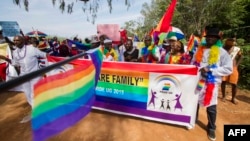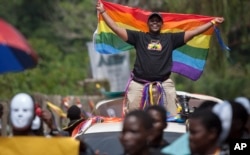In most African countries, lesbian, gay, bisexual, and transgender (LGBT) rights are either limited or nonexistent. In East Africa, however, the LGBT community is rising up to challenge homophobic attitudes and laws.
This February saw the Kenyan LGBT community reach a historic milestone: a Kenyan court began hearing arguments in a case that seeks to repeal laws criminalizing gay sex.
The laws were introduced in Kenya in 1897, when the country was under British rule. People convicted of a violation face up to 14 years in prison.
Activist David Ochar says fellow activists are "thrilled" with the progress they are making, even though homosexuality remains outlawed and socially unacceptable in most African countries.
Ochar says many African politicians use LGBT issues to distract people from bigger everyday problems.
“Religion and culture has been used as a scapegoat to either exclude, jail, blackmail, extort from LGBT individuals in Africa. It’s also a good way [for] the political class trying to cover up issues when there is a lot of corruption, unemployment and issues to do with poverty, disease.... LGBT Issues are a hot cake, you simply use LGBT issues to divert attention," Ochar said.
In April, a Kenyan movie was shown at the Cannes Film Festival in France for the first time. But the lesbian-themed "Rafiki" - named after the Swahili word for "friend" - was banned by the Kenya Film and Classification Board.
Board CEO Ezekiel Mutua explained why the ban was necessary.
“Let me make it very clear, Kenya will not accept homosexuality as a way of life and I want to make it very clear before the media. I would rather lose my job than occupy a public office and allow homosexual groups and foreign donors to destroy our kids with that negative narrative,” Mutua said.
LGBT rights face resistance in other African countries as well.
In Uganda, the LGBT movement has been under severe pressure since lawmakers passed a law in 2013 to make same-sex relations punishable by up to life in prison, even though the country's Constitutional Court invalidated the law.
In Tanzania, President John Magufuli last year slammed foreign NGOs that campaign for gay rights.
Tanzanian gay rights activist Jojo Japhet, who lives in Zanzibar, says the president's comments have led to a surge of arrests and police harassment against the LGBT community. He says this has affected access to health care services.
“[The] majority of them they ran away from towns to the rural areas, so it has been very difficult for us who are working and operating to help them to find them," Japhet said.
Ochar believes Magufuli is working against Tanzania's best interests.
“It is sad that he does not see that actually when LGBT inclusion is part of the agenda of the country, it tremendously helps in fight against HIV. When LGBT folks are not given the attainable health standards that they can get, then the fight against HIV is actually hindered,” Ochar said.
Homosexuality remains illegal in Kenya, Uganda, Tanzania and every country on the continent except South Africa.





